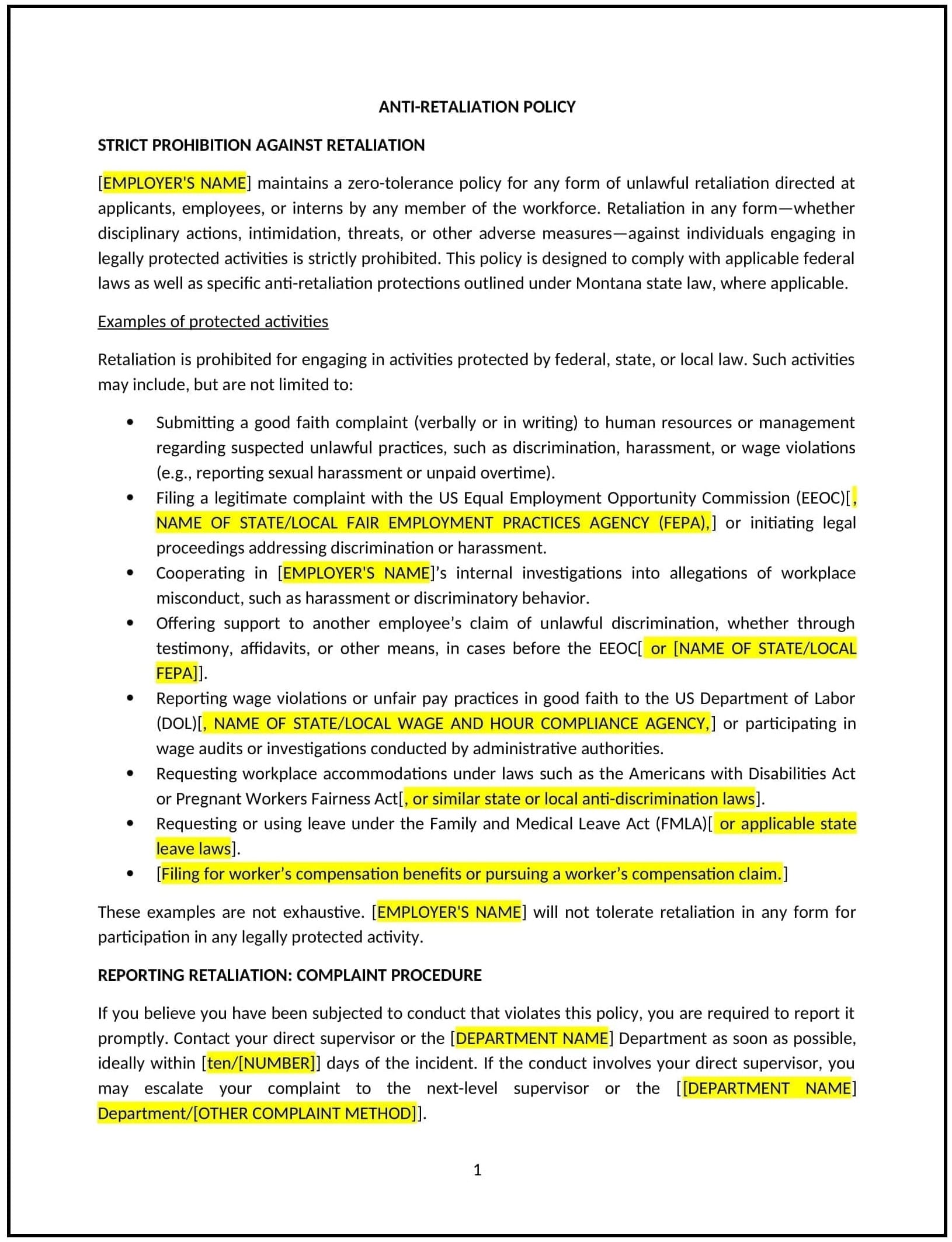Got contracts to review? While you're here for policies, let Cobrief make contract review effortless—start your free review now.

Customize this template for free
Anti-retaliation policy (Montana)
An anti-retaliation policy helps Montana businesses protect employees from adverse actions after reporting workplace concerns. This policy outlines protections for employees who report misconduct, discrimination, harassment, safety violations, or other unethical behavior. It also establishes clear procedures for handling retaliation complaints and disciplinary actions against those who engage in retaliatory behavior.
By implementing this policy, businesses can encourage employees to report concerns without fear, foster a culture of transparency, and reduce legal risks associated with workplace retaliation claims.
How to use this anti-retaliation policy (Montana)
- Define retaliation: Businesses should clearly outline what constitutes retaliation, including termination, demotion, pay reduction, negative performance reviews, or any other adverse actions taken against employees who report concerns.
- Establish reporting procedures: Employees should have multiple ways to report retaliation, such as through HR, a designated compliance officer, or an anonymous reporting system.
- Outline investigation protocols: Businesses should define how retaliation complaints will be reviewed, ensuring a fair and confidential process. Investigations should be documented and conducted by impartial personnel.
- Set clear consequences for retaliation: Businesses should establish disciplinary actions for those who engage in retaliatory behavior, which may include warnings, suspension, or termination.
- Protect whistleblowers: Businesses should emphasize that employees have the right to report concerns without facing any form of punishment. Protections should extend to employees who participate in workplace investigations.
- Communicate non-retaliation expectations: Managers and supervisors should be trained to recognize and prevent retaliatory behavior, ensuring that employees feel safe when raising concerns.
- Review and update regularly: Businesses should periodically assess the policy to reflect changes in Montana labor laws, workplace conditions, or feedback from employees.
Benefits of using this anti-retaliation policy (Montana)
This policy provides several key benefits for Montana businesses:
- Encourages employees to report misconduct: Employees are more likely to speak up about workplace concerns when protected from retaliation.
- Reduces legal risks: A clear policy helps businesses mitigate the risk of legal claims related to wrongful termination or retaliation.
- Promotes ethical business practices: Businesses that prevent retaliation create a culture of transparency and integrity.
- Strengthens trust in leadership: Employees are more engaged when they know they can report issues without fear of negative consequences.
- Provides clear dispute resolution: A structured process for addressing retaliation claims ensures fairness and consistency.
- Supports compliance with state and federal protections: Businesses can align their practices with legal safeguards for whistleblowers and workplace complaints.
Tips for using this anti-retaliation policy (Montana)
- Communicate the policy clearly: Businesses should ensure that employees and managers understand the policy and reporting procedures.
- Provide confidential reporting options: Employees should have secure ways to report retaliation concerns without fear of exposure.
- Train leadership on non-retaliation: Managers should receive training to prevent and address retaliation claims appropriately.
- Apply disciplinary measures consistently: Businesses should enforce anti-retaliation policies fairly across all levels of the organization.
- Document complaints and investigations: Businesses should keep records of reported retaliation claims, investigations, and outcomes.
- Regularly review policy effectiveness: Businesses should assess whether the policy is being followed and make updates as needed.